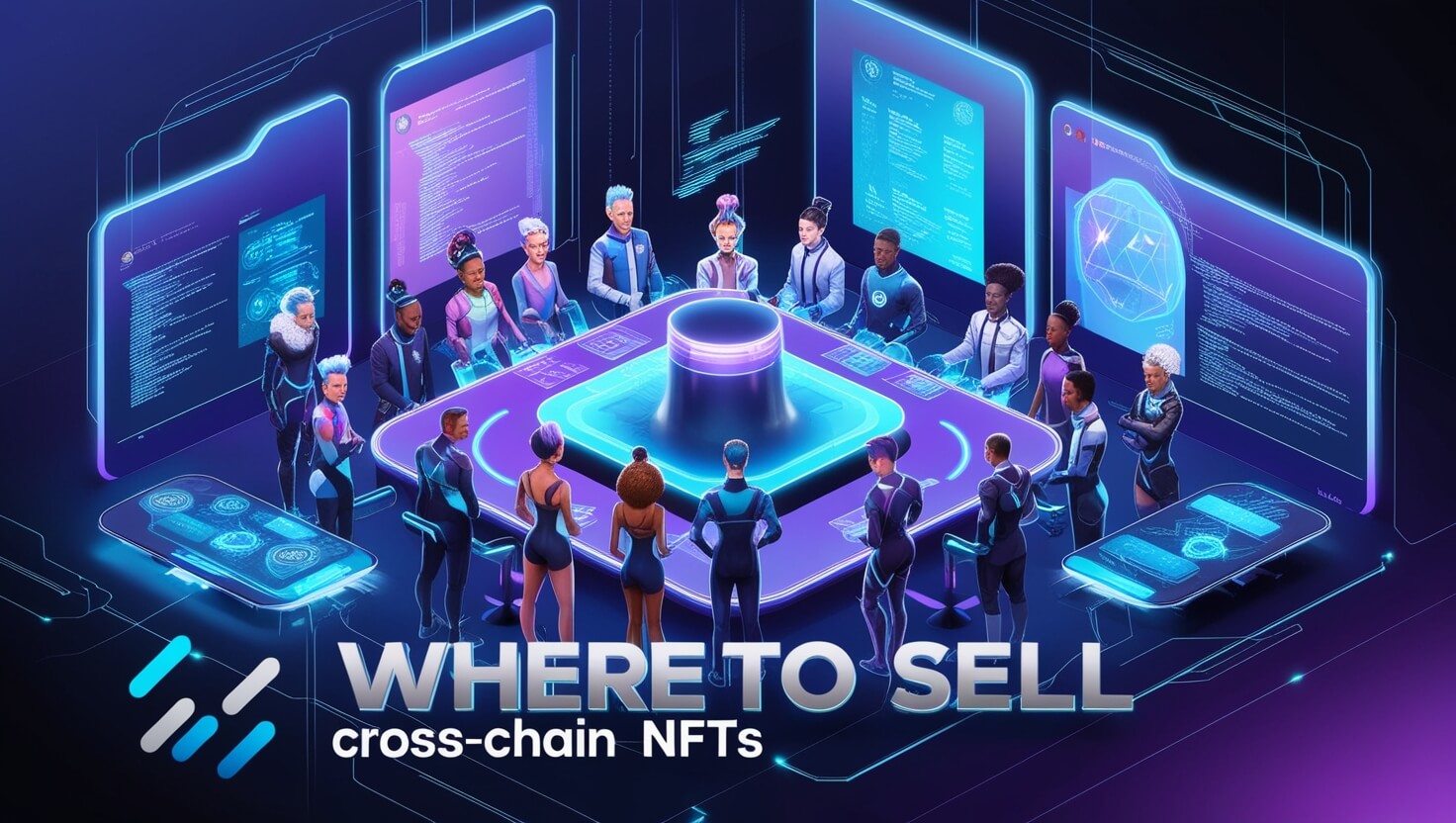In this article, I will cover the Where to Sell Cross-Chain NFTs while taking into consideration the best multi-blockchain platforms.
Like any other NFT, selling cross-chain NFTs provides increased visibility as well as liquidity, which gives both the creator and the collector an opportunity to use different markets.
i will analyze the characteristics, advantages, and the distinct features of well-known platforms so you can decide which one meets your requirements the best.
What is NFTs?
NFTs are unique digital assets authenticated with the owners’ identity via blockchain technology.
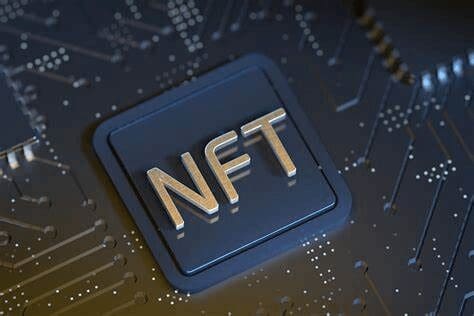
NFTs can be anything digital such as an artwork, music, or even a piece of property like virtual land. NFTs cannot be compared to currencies like bitcoin, where one bitcoin is interchangeable with another and identical to it.
NFTs, on the other hand, are one-of-a-kind and non-interchangeable. This feature enables the token to serve as proof for scarce or unique digital belongings, which can be monetized by the creators and collected by fan followers.
Where to Sell Cross-Chain NFTs
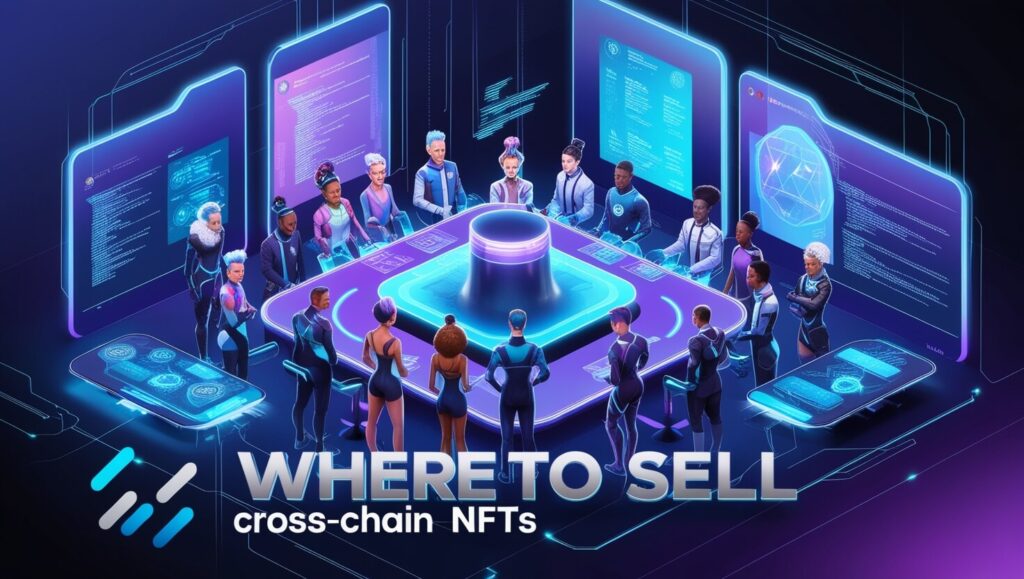
Here is a simple guide to selling cross-chain NFTs using NFTrade as an example.
Create an Account
Go to NFTrade and register for an account.
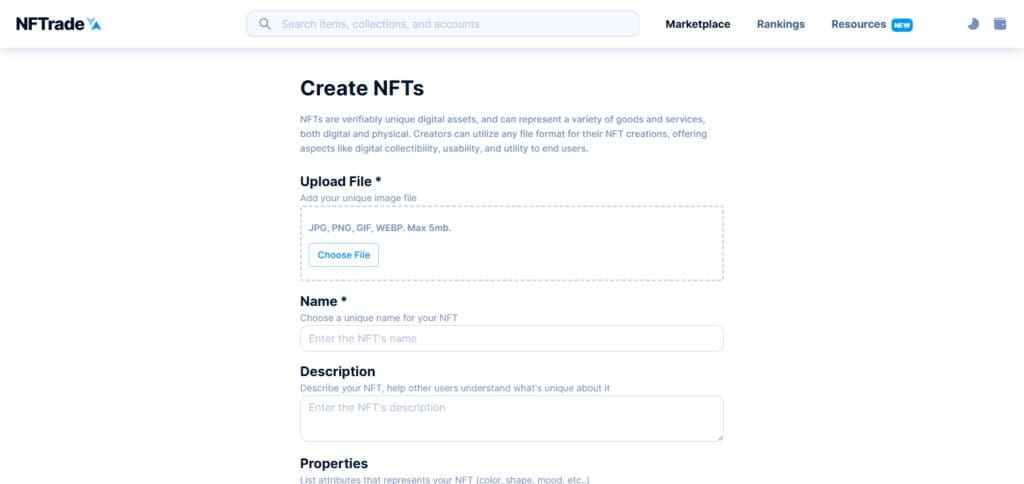
Link your crypto wallet (such as MetaMask) to the platform.
Examine Supported Blockchains
NFTrade supports a couple of blockchains like Ethereum, Polygon, and Binance Smart Chain to name a few.
Make sure that your NFT works with one of the supported chains.
Create An NFT Listing
Head to “Create” or “Sell” on NFTrade and select it.
Either upload your NFT or select it from your connected wallet.
Specify a price or select an auction style listing.
Adjust Cross-Chain Settings
Allow if necessary set limits to allow buyers from different blockchains to view your NFT.
Check for any other additional costs or restrictions for handling cross-chain transactions.
Improve NFT Listing Visibility
Promote your NFT on social media or forums and other communities where you expect possible buyers.
Sell your NFTs by levering marketing-like propositions like “This NFT can unlock so many unique doors/features/utilities…”
Finalize the transaction
After a buyer buys your NFT, an escrow transaction will be executed through NFTrade’s secure system.
In your wallet, you will be paid, and the buyer will receive the NFT.
Reinvest or Withdraw
Track your earnings and withdraw them or reinvest in different NFTs or begin new ventures in blockchain projects.
Follow changes in the market so as to not miss out on new chances.
Security & Management Tips
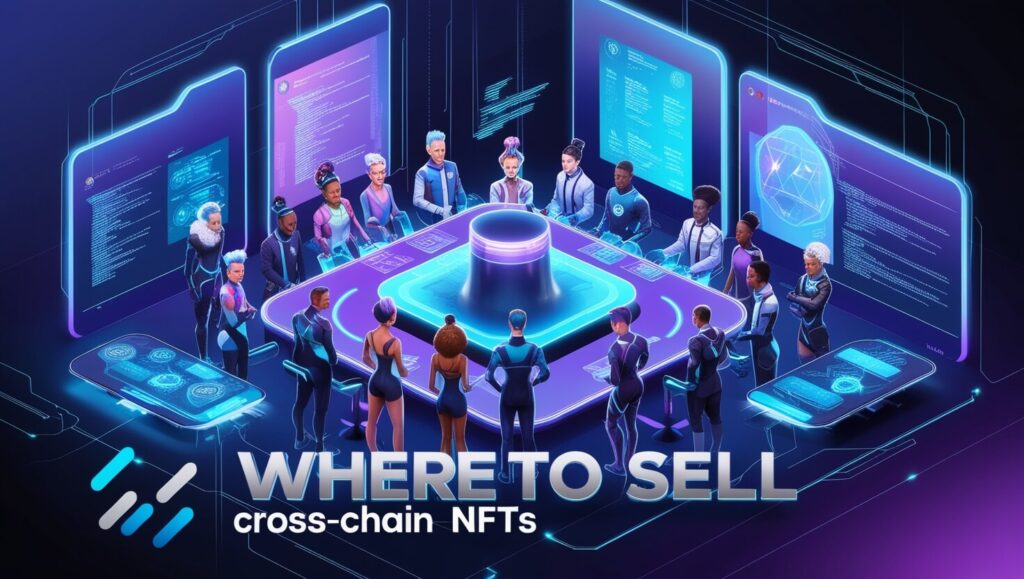
Security :
Smart Contract Risks: Cross-chains are built on smart contracts. These can be hacked, or contain bugs, making them less secure. Moreover, if a platform’s code is compromised, you can lose your assets.
Phishing attacks and Fraud: Numerous marketplaces surrounding NFTs are victims of phishing scams that deceive users into surrendering their private keys or conducting unauthorized transactions.
Security of Wallets: Users have the responsibility to secure their wallets using hardware wallets and enabling two-factor authentication. If you lose your wallet, you lose the NFTs.
Management :
Use Well Known Marketplaces: Always use marketplace infrastructures that gave proven reputations such as OpenSea, NFTrade, and Rarible since they are known to be vetted for security.
Verify The SmartContract Code: Verify that the platform does not use closed-source smart contracts, or if they are, that they are audited by trustworthy third parties.
Use Stronger Multi-factor Identification: A secured wallet should require stronger encrypted passwords, and even consider using hardware wallets.
Update Software Regularly: Ensure your wallet and marketplace app, or even browser extensions, are current. Doing so minimizes the likelihood of security gaps. With the right security precautions, selling cross-chain NFTs hardly has risks and can be very beneficial.
Pros & Cons
Pros
Selling Opportunities Expand: Support for cross-chains means you can sell your NFTs across several blockchains instead of just one, which helps you reach more people. This vastly improves the chance to sell more NFTs.
Higher Liquidity: Being available on multiple blockchains increases the number of people that are able to buy your NFTs, resulting in increased liquidity which reduces the risk of your NFTs remaining unsold.
Greater Control: Sellers have more power regarding sales because they can simply decide which blockchain has the most advantageous transaction fees, speeds, or other useful features for their NFTs.
Multi-Community Access: A cross-chain platform helps you engage with niche communities that exist in different blockchain ecosystems, thereby increasing exposure and chances of sales. Each blockchain has a distinct NFT community, making it easier for you to sell your NFTs on a cross-chain platform.
Cost Efficient: Ethereum is comparatively expensive for transactions. Fees on blockchains like Polygon or Solana are cheaper, especially for cross-chain supporting platforms, making the overall cost lower.
Cons
Complication: Selling, minting, or listing NFTs individually varies from one blockchain to another in terms of tools offered, which can be a hassle. Keeping track of NFTs across multiple blockchains can be very complex.
Risk to Security: A cross-chain platform depends greatly on bridging technology and smart contracts which can make them prone to hacking or technical issues, which can cause loss of assets.
Limited Buyer Faimilarity: There are buyers out there who don’t have cross-chain transactions knowledge or simply prefer staying on a single blockchain, which condenses the number of sellers and buyers interested.
Platform Reliability: Some of the newer cross-chain platforms may lack the support and credibility of single-chain ones such as OpenSea and increase the chances of platform outage or other technical challenges.
Fees Across Blockchains: Although some blockchains have small fee charges, these are particularly large for those using bridges or swaps across chains which tend to charge an arm and a leg for a myriad of processes and transactions.
Top Platforms for Selling Cross-Chain NFTs
NFTrade
NFTrade is a platform which is in the leading position when it comes to selling cross-chain NFTs as its multi-blockchain integration gives it a competitive advantage.
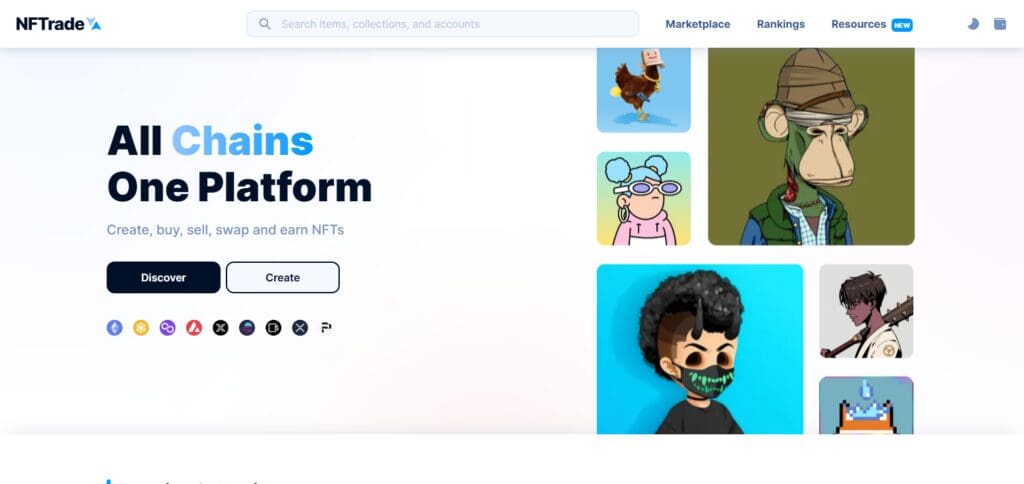
It enables creators to sell or list NFTs on Ethereum, Polygon, Binance Smart Chain, and several other platforms without having to depend on external bridges.
This feature improves NFTrade’s reach as well as the users’ flexibility which is beneficial for everyone. The simple to use interface, low fees, and the lack of restrictions makes NFTrade a great option for users interested in cross-chain NFT trading.
Rarible
Rarible is a well-known platform for buying and selling cross-chain NFTs and supports Ethereum, Polygon, and Solana blockchains. What sets the platform apart is its governance feature in which users can vote on platform decisions using RARI tokens.
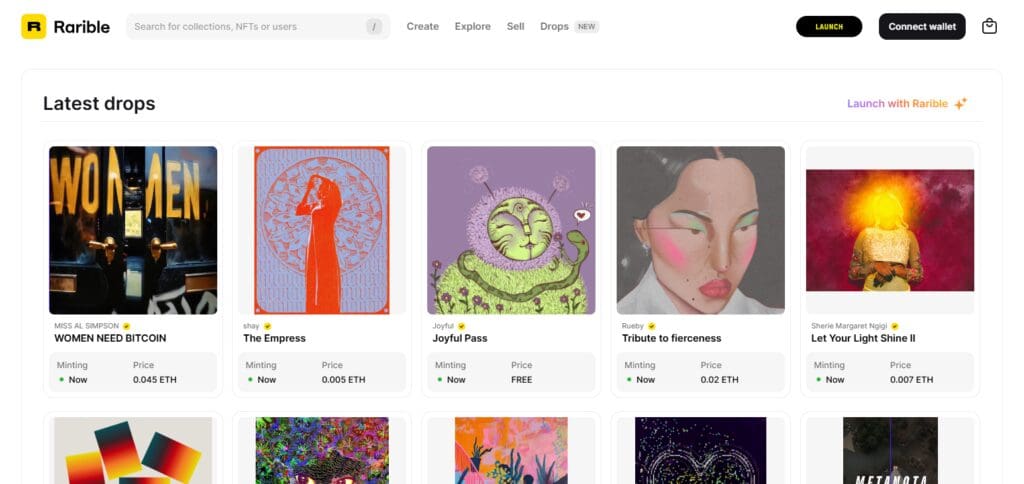
This gives users more power over how the marketplace develops. Additionally, Rarible enables royalties for users and gives them the freedom to set their own terms which is beneficial to creators as well as collectors.
OpenSea
OpenSea remains at the forefront for selling crosschain NFTs. Their main advantage is their support for multiple blockchains, including Ethereum, Polygon, and Klaytn.
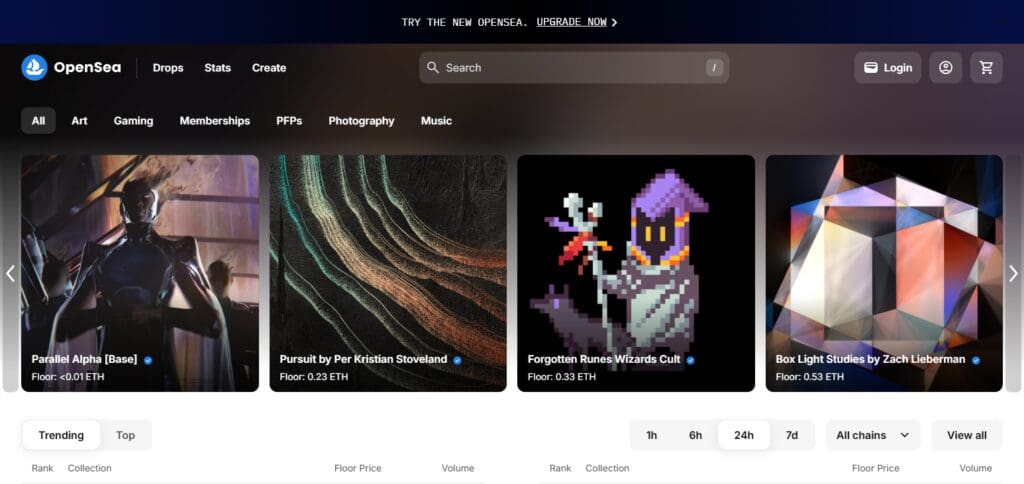
In addition, the platform offers art NFTs, virtual items, and more – along with an easy to use interface. Also, their strong security measures make it effortless for users to list and purchase NFTs cross-chain which makes OpenSea a leader in the market.
Conclusion
To sum up selling cross-chain NFTs has benefits like added exposure, new market access, and enhanced liquidity. NFTrade, Rarible, and OpenSea have effortless cross-chain support, all doing things differently in terms of decentralized governance and large user audiences.
Choose a marketplace that meets your objectives and security standards and gain assistance in achieving your goals in the vast world of cross-chain NFTs.



